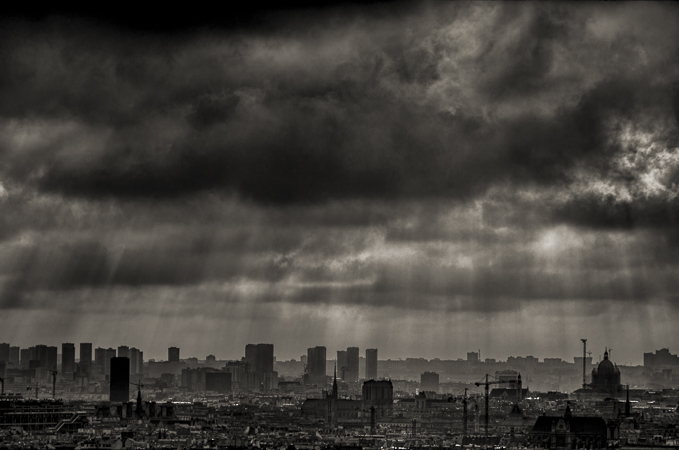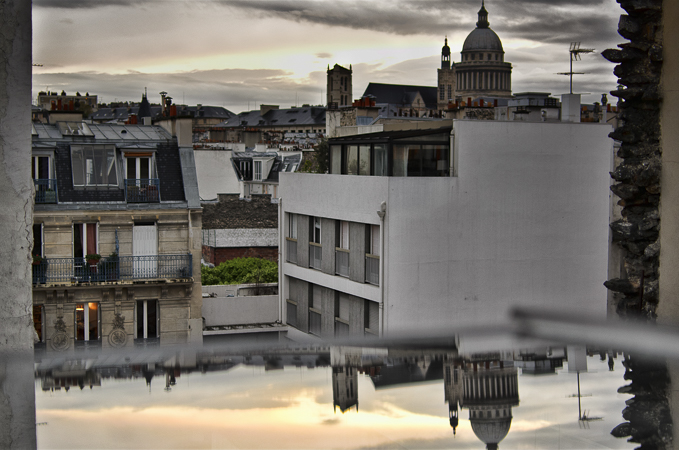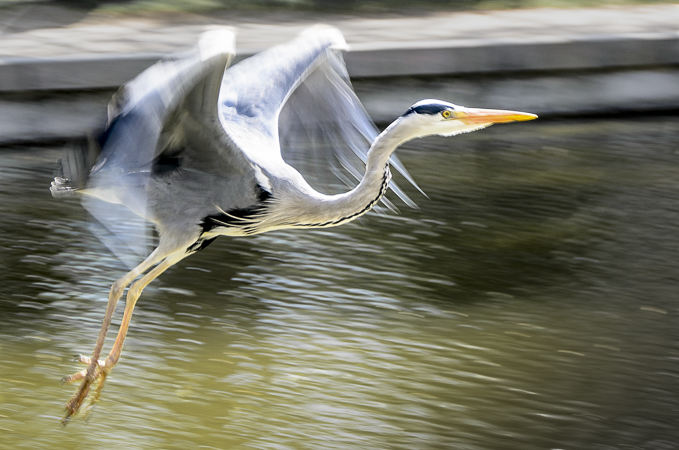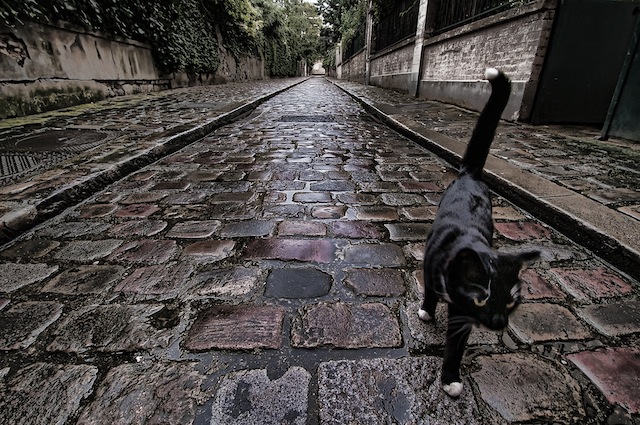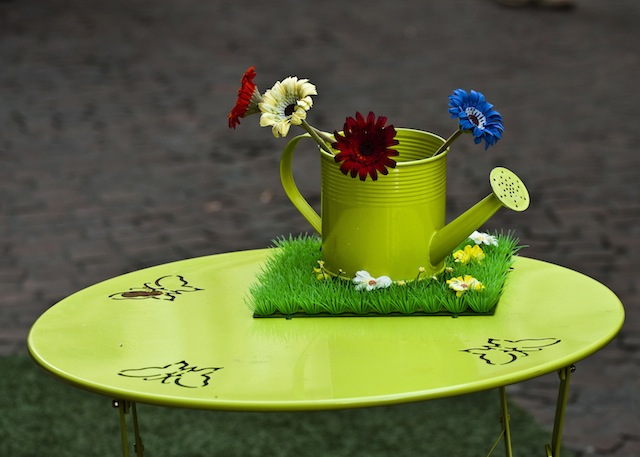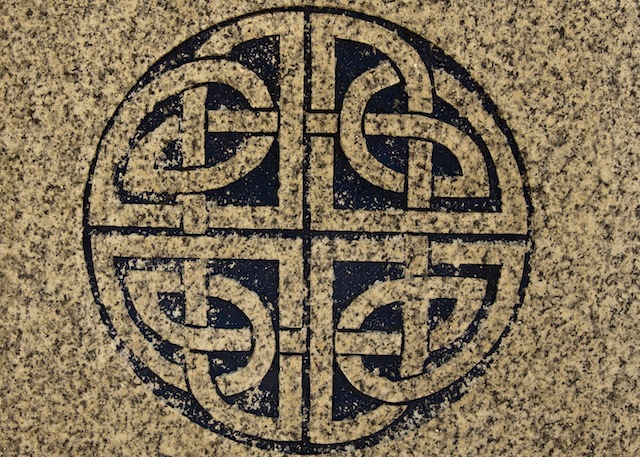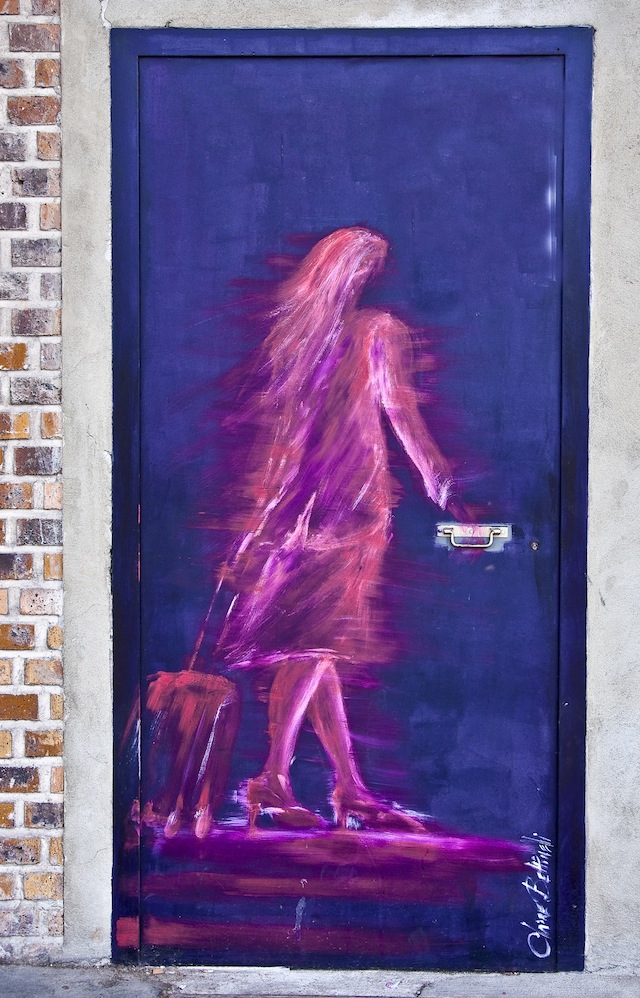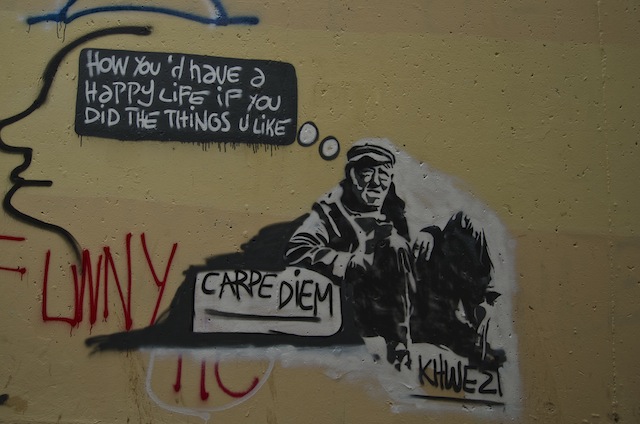 Rimbaud by Ariane Pasco/Nice Art
Rimbaud by Ariane Pasco/Nice Art
Sunday was a Rimbaud kind of day.
In the morning I posted an aerial image on Facebook of l’Île de la Cité and the Seine in Paris that my friend Anne Hines Reese had posted earlier. This worldwide Facebook interconnectivity is such an astonishing thing. You can participate in a salon that reaches beyond your city, beyond your country, beyond your continent, and discuss whatever subjects fascinate you, with like-minded people.
So I shared this beautiful aerial photo of Paris that morning, and was struck by how much the island looks like a boat from this angle, which made me think of Rimbaud’s poem, “Le Bateau Ivre.” We have a book of his poems in our apartment, but I didn’t have the book at hand in my studio, so went online, looked up the poem, found an English translation, and posted just one stanza below the photo.
 "What a Surprise," street art by Kashink
"What a Surprise," street art by Kashink
I think a lot about time, especially the spirit of time. Sunday: the Sun’s day: Apollo’s day: a good day for entertainment and enjoyment, a good day to take a break from work.
Richard and I set out for a long walk from our fifth arrondissement through the fourth through the eleventh to the twentieth. It was a sunny day, bright blue sky, and all along the rue de Charonne we passed newly pasted-up work by one of our favorite street artists, Kashink. Each of her double-eyed colorful heads had either a number or an image on the brow. Richard photographed each one and I wondered aloud if the numbers corresponded to street addresses. We checked, but no. A mystery. We’d have to ask Kashink.

At the corner of rue de Charonne and Boulevard de Charonne, I had a drunken boat conversation with a local clochard wearing a plush cheetah as a stole (C'ést votre petite amie? Oui! Et elle est féroce. Oui! he roared), while Richard shot his portrait, then paid him €2 for the privilege.
Richard took me to a wonderful old brick factory building on Villa Riberolle, an alley that dead ends at Père-Lachaise cemetery, where artists had either squatted or leased space. We’d considered renting one for a studio that doubled for photography and writing, but I needed something closer to home, or I’d never have used it.
 In the Name of Love #4, by Roswitha Guillemin
In the Name of Love #4, by Roswitha Guillemin
We walked on to a squat on rue Stendahl to catch the closing day of Walls and Rights (Richard had photographed opening night), an exhibition filled with the work of street artists in support of gender and sexual equality, and AIDS research. We talked with three members of the seven-member art collective, No Rules Corp. And to two artists, Roswitha and Christine, who were long-time friends who have been sending each other postal art for 20 years or so.
 Ariane Pasco of Nice Art
Ariane Pasco of Nice Art
Then an artist named Ariane (my favorite mythical figure) walked up to me and handed me a collage with a portrait of Rimbaud on it. A gift! Astonishing! It was black, white and gray with rosy red marks and torn on the edges and I instantly loved it. And at the same time was struck with wonder: I’ve never posted a poem or even a line by Rimbaud on Facebook before. How very odd that the only day I happened to do this, Ariane should give me her collage with the poet’s face on it. I exclaimed over this to her, and to Roswitha and Christine.
Roswitha told me that one day she went to a Serge Gainsbourg event in Paris, and that same day, an envelope with an image of Serge Gainsbourg arrived at her house from her friend Christine. They’d never discussed the French actor/singer. It was just…
What do you call this? The word synchronicity doesn’t seem to capture its magic. I’m looking for a new word to describe this phenomenon, the “aha!” moment that happens when it shows itself so clearly and deliciously.
I asked the organizer of the show if she had some cardboard that I could place around the collage to protect it on our long walk home. Yes, she said, and brought me a roll of cardboard, which I wrapped in a clean trash bag.

But first we stopped at a restaurant at Place Gambetta. As we sat eating a Caesar salad and onion soup, I looked up at the side of the entrance. There, in big letters: Absinthe Traditionnelle Rimbaud.
Okay, let’s just call it magic.
Later at home, in a phone call with my brother, Jon, I told him the story and he described a similar experience of what he calls “the connectivity of the universe,” with his green building company and community. Then he proceeded to answer a question that Richard and I have in a way you might call lightning (an idea so brilliant I can’t talk about it until we make it happen)—lightning, yes! And magic.
I think I’m going to name days from now on.
Sunday was Rimbaud Day.

The Drunken Boat
by Arthur Rimbaud,
translated by Rebecca Seiferle, editor, The Drunken Boat
As I descended impassible Rivers,
I felt no longer steered by bargemen;
they were captured by howling Redskins,
nailed as targets, naked, to painted stakes.
What did I care for cargo or crews,
bearers of English cotton or Flemish grain—
having left behind bargemen and racket,
the Rivers let me descend where I wished.
In the furious splashing of the waves,
I — that other winter, deafer than the minds
of children — ran! And the unanchored Peninsulas
never knew a more triumphant brouhaha.
The tempest blessed my sea awakening.
Lighter than cork, I danced the waves
scrolling out the eternal roll of the dead—
ten nights, without longing for the lantern's silly eye.
Sweeter than the flesh of tart apples to children,
the green water penetrated my pine hull
and purged me of vomit and the stain of blue wines—
my rudder and grappling hooks drifting away.
Since then, I have bathed in the Poem
of the Sea, a milky way, infused with stars,
devouring the azure greens where, flotsam-pale
and ravished, drowned and pensive men float by.
Where, suddenly staining the blues, delirious
and slow rhythms under the glowing red of day,
stronger than alcohol, vaster than our lyrics,
ferment the red bitters of love!
I know heavens pierced by lightning, the waterspouts
and undertows and currents: I know night,
Dawn rising like a nation of doves,
and I've seen, sometimes, what men only dreamed they saw!
I've seen the sun, low, a blot of mystic dread,
illuminating with far-reaching violet coagulations,
like actors in antique tragedies,
the waves rolling away in a shiver of shutters.
I've dreamed a green night to dazzling snows,
kisses slowly rising to the eyelids of the sea,
unknown saps flowing, and the yellow and blue
rising of phosphorescent songs.
For months, I've followed the swells assaulting
the reefs like hysterical herds, without ever thinking
that the luminous feet of some Mary
could muzzle the panting Deep.
I've touched, you know, incredible Floridas
where, inside flowers, the eyes of panthers mingle
with the skins of men! And rainbows bridle
glaucous flocks beneath the rim of the sea!
I've seen fermenting— enormous marshes, nets
where a whole Leviathan rots in the rushes!
Such a ruin of water in the midst of calm,
and the distant horizon worming into whirlpools!
Glaciers, silver suns, pearly tides, ember skies!
Hideous wrecks at the bottom of muddy gulfs
where giant serpents, devoured by lice,
drop with black perfume out of twisted trees!
I wanted to show children these dorados
of the blue wave, these golden, singing fish.
A froth of flowers has cradled my vagrancies,
and ineffable winds have winged me on.
Sometimes like a martyr, tired of poles and zones,
the sea has rolled me softly in her sigh
and held out to me the yellow cups of shadow flowers,
and I've remained there, like a woman, kneeling . . .
Almost an island, balancing the quarrels,
the dung, the cries of blond-eyed birds on the gunnels
of my boat, I sailed on, and through my frail lines,
drowned men, falling backwards, sank to sleep.
Now, I, a boat lost in the hair of the coves,
tossed by hurricane into the birdless air,
me, whom all the Monitors and Hansa sailing ships
could not salvage, my carcass drunk with sea;
free, rising like smoke, riding violet mists,
I who pierced the sky turning red like a wall,
who bore the exquisite jam of all good poets,
lichens of sun and snots of azure,
who, spotted with electric crescents, ran on,
a foolish plank escorted by black hippocamps,
when the Julys brought down with a single blow
the ultramarine sky with its burning funnels;
I who tremble, feeling the moan fifty leagues away
of the Behemoth rutting and the dull Maelstrom,
eternal weaver of the unmovable blue—
I grieve for Europe with its ancient breastworks!
I've seen thunderstruck archipelagos! and islands
that open delirious skies for wanderers:
Are these bottomless nights your nest of exile,
O millions of gold birds, O Force to come?
True, I've cried too much! Dawns are harrowing.
All moons are cruel and all suns, bitter:
acrid love puffs me up with drunken slowness.
Let my keel burst! Give me to the sea!
If I desire any of the waters of Europe, it's the pond
black and cold, in the odor of evening,
where a child full of sorrow gets down on his knees
to launch a paperboat as frail as a May butterfly.
Bathed in your languors, o waves, I can no longer
wash away the wake of ships bearing cotton,
nor penetrate the arrogance of pennants and flags,
nor swim past the dreadful eyes of slave ships.
Le Bateau Ivre
Comme je descendais des Fleuves impassibles,
Je ne me sentis plus guidé par les haleurs :
Des Peaux-Rouges criards les avaient pris pour cibles
Les ayant cloués nus aux poteaux de couleurs.
J'étais insoucieux de tous les équipages,
Porteur de blés flamands ou de cotons anglais.
Quand avec mes haleurs ont fini ces tapages
Les Fleuves m'ont laissé descendre où je voulais.
Dans les clapotements furieux des marées
Moi l'autre hiver plus sourd que les cerveaux d'enfants,
Je courus ! Et les Péninsules démarrées
N'ont pas subi tohu-bohus plus triomphants.
La tempête a béni mes éveils maritimes.
Plus léger qu'un bouchon j'ai dansé sur les flots
Qu'on appelle rouleurs éternels de victimes,
Dix nuits, sans regretter l'oeil niais des falots !
Plus douce qu'aux enfants la chair des pommes sures,
L'eau verte pénétra ma coque de sapin
Et des taches de vins bleus et des vomissures
Me lava, dispersant gouvernail et grappin
Et dès lors, je me suis baigné dans le Poème
De la Mer, infusé d'astres, et lactescent,
Dévorant les azurs verts ; où, flottaison blême
Et ravie, un noyé pensif parfois descend ;
Où, teignant tout à coup les bleuités, délires
Et rythmes lents sous les rutilements du jour,
Plus fortes que l'alcool, plus vastes que nos lyres,
Fermentent les rousseurs amères de l'amour !
Je sais les cieux crevant en éclairs, et les trombes
Et les ressacs et les courants : Je sais le soir,
L'aube exaltée ainsi qu'un peuple de colombes,
Et j'ai vu quelque fois ce que l'homme a cru voir !
J'ai vu le soleil bas, taché d'horreurs mystiques,
Illuminant de longs figements violets,
Pareils à des acteurs de drames très-antiques
Les flots roulant au loin leurs frissons de volets !
J'ai rêvé la nuit verte aux neiges éblouies,
Baiser montant aux yeux des mers avec lenteurs,
La circulation des sèves inouïes,
Et l'éveil jaune et bleu des phosphores chanteurs !
J'ai suivi, des mois pleins, pareille aux vacheries
Hystériques, la houle à l'assaut des récifs,
Sans songer que les pieds lumineux des Maries
Pussent forcer le mufle aux Océans poussifs !
J'ai heurté, savez-vous, d'incroyables Florides
Mêlant aux fleurs des yeux de panthères à peaux
D'hommes ! Des arcs-en-ciel tendus comme des brides
Sous l'horizon des mers, à de glauques troupeaux !
J'ai vu fermenter les marais énormes, nasses
Où pourrit dans les joncs tout un Léviathan !
Des écroulement d'eau au milieu des bonaces,
Et les lointains vers les gouffres cataractant !
Glaciers, soleils d'argent, flots nacreux, cieux de braises !
Échouages hideux au fond des golfes bruns
Où les serpents géants dévorés de punaises
Choient, des arbres tordus, avec de noirs parfums !
J'aurais voulu montrer aux enfants ces dorades
Du flot bleu, ces poissons d'or, ces poissons chantants.
- Des écumes de fleurs ont bercé mes dérades
Et d'ineffables vents m'ont ailé par instants.
Parfois, martyr lassé des pôles et des zones,
La mer dont le sanglot faisait mon roulis doux
Montait vers moi ses fleurs d'ombre aux ventouses jaunes
Et je restais, ainsi qu'une femme à genoux...
Presque île, balottant sur mes bords les querelles
Et les fientes d'oiseaux clabaudeurs aux yeux blonds
Et je voguais, lorsqu'à travers mes liens frêles
Des noyés descendaient dormir, à reculons !
Or moi, bateau perdu sous les cheveux des anses,
Jeté par l'ouragan dans l'éther sans oiseau,
Moi dont les Monitors et les voiliers des Hanses
N'auraient pas repêché la carcasse ivre d'eau ;
Libre, fumant, monté de brumes violettes,
Moi qui trouais le ciel rougeoyant comme un mur
Qui porte, confiture exquise aux bons poètes,
Des lichens de soleil et des morves d'azur,
Qui courais, taché de lunules électriques,
Planche folle, escorté des hippocampes noirs,
Quand les juillets faisaient crouler à coups de triques
Les cieux ultramarins aux ardents entonnoirs ;
Moi qui tremblais, sentant geindre à cinquante lieues
Le rut des Béhémots et les Maelstroms épais,
Fileur éternel des immobilités bleues,
Je regrette l'Europe aux anciens parapets !
J'ai vu des archipels sidéraux ! et des îles
Dont les cieux délirants sont ouverts au vogueur :
- Est-ce en ces nuits sans fond que tu dors et t'exiles,
Million d'oiseaux d'or, ô future Vigueur ? -
Mais, vrai, j'ai trop pleuré ! Les Aubes sont navrantes.
Toute lune est atroce et tout soleil amer :
L'âcre amour m'a gonflé de torpeurs enivrantes.
Ô que ma quille éclate ! Ô que j'aille à la mer !
Si je désire une eau d'Europe, c'est la flache
Noire et froide où vers le crépuscule embaumé
Un enfant accroupi plein de tristesses, lâche
Un bateau frêle comme un papillon de mai.
Je ne puis plus, baigné de vos langueurs, ô lames,
Enlever leur sillage aux porteurs de cotons,
Ni traverser l'orgueil des drapeaux et des flammes,
Ni nager sous les yeux horribles des pontons.

 10.17.2014
10.17.2014 